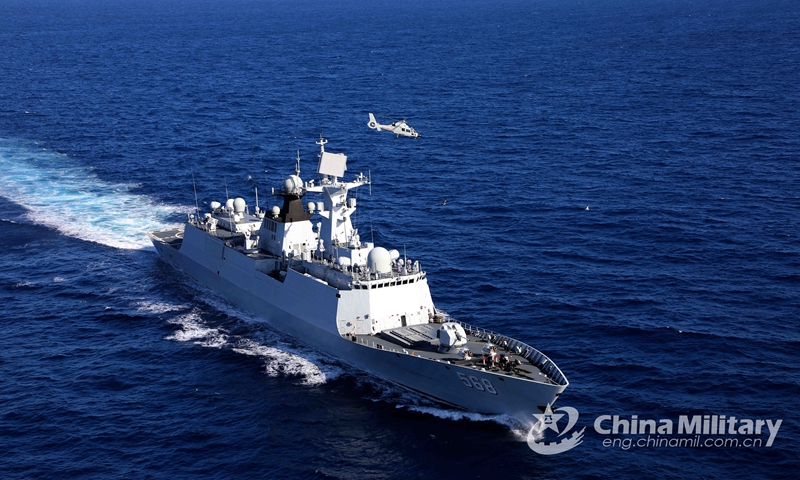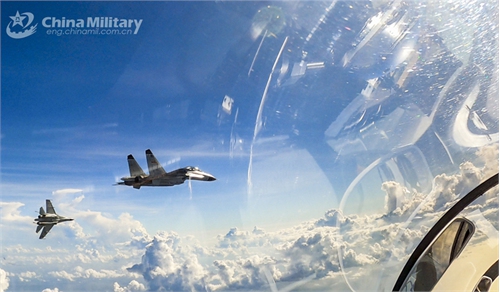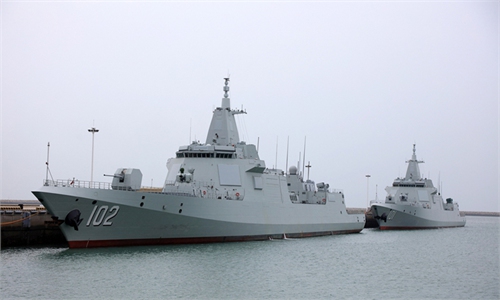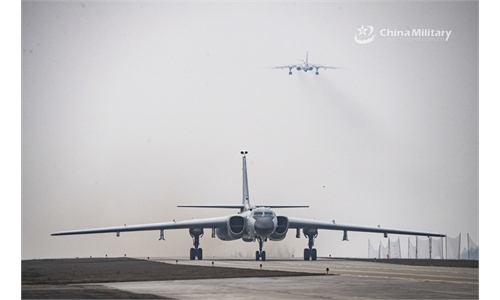Chinese, Japanese defense ministries establish direct telephone line for maritime, air liaison mechanism

A ship-borne helicopter attached to a naval flotilla under the PLA Southern Theater Command takes off from the guided-missile frigate Hengyang (Hull 568) during a combined arms training exercise. Photo: China Military Online
One day before the Japanese foreign minister's scheduled visit to China, China's Ministry of National Defense announced on Friday that the direct telephone line for the maritime and air liaison mechanism between the Chinese and Japanese defense ministries has been established, a move experts said is a positive signal showing that Chinese-Japanese relations are improving, and that military crises between the two countries will be less likely.
According to a work plan agreed upon by the defense ministries of China and Japan, the two sides have recently completed the establishment of a direct telephone line for the maritime and air liaison mechanism, and will keep in touch over its launch arrangement, according to a press release from the Chinese Defense Ministry on Friday.
The completion of the direct telephone line will effectively enrich the communication channels between China and Japan's defense ministries, boost both sides' crisis management capabilities in sea and air, and help further safeguard regional peace and stability, the Chinese Defense Ministry said.
On the same day, China's Ministry of Foreign Affairs announced that Japan's Minister for Foreign Affairs Yoshimasa Hayashi will visit China from Saturday to Sunday at the invitation of Chinese State Councilor and Foreign Minister Qin Gang.
Zhou Yongsheng, deputy director of the Japanese Studies Center at China Foreign Affairs University, told the Global Times on Friday that Hayashi's visit to China shows that Chinese-Japanese relations have eased after a difficult period.
The announcement from the Chinese Defense Ministry on the eve of the visit shows China's sincerity, Zhou said.
Analysts said that the announcement is significant because China and Japan agreed to start developing an emergency maritime liaison mechanism as early as 2007. The direct telephone line is the core of the maritime-air liaison mechanism, which is a mutual notification system between the two countries intended to maintain communication in emergency situations. However, establishment of the phone line took more than a decade.
The responsibility for this lies entirely with Japan, experts said. They pointed out that in 2012, China and Japan had already basically reached a consensus, but Japanese politicians later announced their so-called purchase of the Diaoyu Islands and their intention to "nationalize" them, resulting in suspension of the plan to set up the line.
In addition to unfavorable political factors from Japan, there was also no consensus on certain technical aspects, an expert who requested anonymity told the Global Times on Friday.
The establishment of a direct telephone line is considered to be of great practical significance, with Zhou saying that it will reduce friction between China and Japan, helping both sides maintain communication, avoid misunderstandings or misjudgments, conduct crisis management, and prevent friction from escalating or situations from deteriorating.
Song Zhongping, a Chinese military expert and TV commentator, told the Global Times on Friday that the defense ministries of both countries can use the phone line for regular exchanges to maintain contact.
This phone line can also be used in some emergency situations such as those regarding the Diaoyu Islands or the East China Sea, where misunderstandings or misjudgments may occur between both countries' military forces, Song said.
Japan has also been working with the US in conducting close-in reconnaissance on China and holding joint exercises in sensitive regions, posing national security threats to China and resulting in possible friction. The phone line could also see application in these scenarios, Song said.
Japan has been proclaiming that "a Taiwan emergency is a Japanese emergency," attempting to interfere in the Taiwan question as well as hyping the "China threat" theory. So the phone line could also help reduce the risk of an accidental conflict in the Taiwan Straits, another Chinese military expert who asked not to be named told the Global Times on Friday.
On Thursday, Japan's Defense Ministry Joint Staff said in a press release that Japan's Maritime Self-Defense Force on Wednesday spotted a PLA naval flotilla consisting of the Type 055 large destroyer Anshan, the Type 052D destroyer Qiqihar and the Type 903A replenishment ship Taihu entering the Sea of Japan from the East China Sea via the Tsushima Strait.
This is likely a routine far sea training exercise by the PLA Navy, and when the direct phone line comes into use, the two sides can notify each other of such drills when necessary, experts said.




